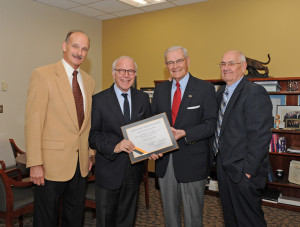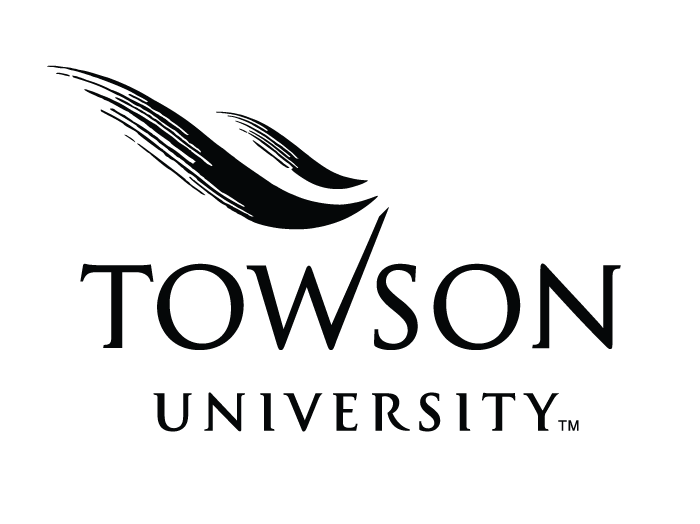After 27 years of hosting the Maryland Senior Olympics, Towson University can now claim its own award from the games. The MSO has honored the university with its 2013 Robert G. Zielger Service Award. Current and past MSO chairs Henry Dahlen, Robert Eikenberg and Robert G. Ziegler presented the plaque on Friday.
“We’re tickled [to present the award] because you were so involved with us on so many occasions, and so gracious,” said Ziegler at the presentation.
From 1980 to 2007, Towson hosted the Maryland Senior Olympics. It began as a 300-person competition. By the mid-90s, it had grown to about 1,500 participants. Towson provided all the facilities and equipment, so that the only thing the MSO had to pay for was the catering. Those years of reduced expense added up to a huge difference for the MSO.
“I know [the award is] a very minor thing in the overall scheme, but it’s a sign of appreciation from our organization that wouldn’t exist today if it weren’t for Towson University,” Ziegler said.
The award is named for Ziegler, the former chair of the university’s Physical Education department and the founding chairman of the MSO. In its 33-year history, the organization has had only three chairmen, all of whom came to Towson to present the award to Vice President for Advancement Gary Rubin, who accepted on behalf of President Maravene Loeschke.
“We are honored to receive this recognition,” Rubin said. “Towson has been very fortunate to host these remarkable senior athletes for so many years.”
These days, the MSO’s games are held all over the area, because no one entity has all the facilities needed to host the event in one place. But the significance of Towson’s hosting duties went beyond cost effectiveness and a centralized location. It reached into the value of multigenerational support and interaction.
“We were the only state where a university was willing to support us to this extent,” said MSO past chairman Robert Eikenberg. “We were using 300 students, and a lot of the professors were giving students credit to work the games.”
The MSO requires participants to be aged 50 and older, but what’s special about the event, say the chairs, is that it gives young people a chance to see their elders playing sports and staying fit. The games also help keep seniors committed to competition and engaged in healthy habits.
“It means a lot to the seniors,” said current MSO Chairman Henry Dahlen. “It gives them a place to participate, incentives to keep active, to train.”
Eikenberg offered one more observation on what seniors get out of the games. “To be on the sidelines and listen to the cheering from the grandkids—‘Go Nana!’—is something really neat.”

